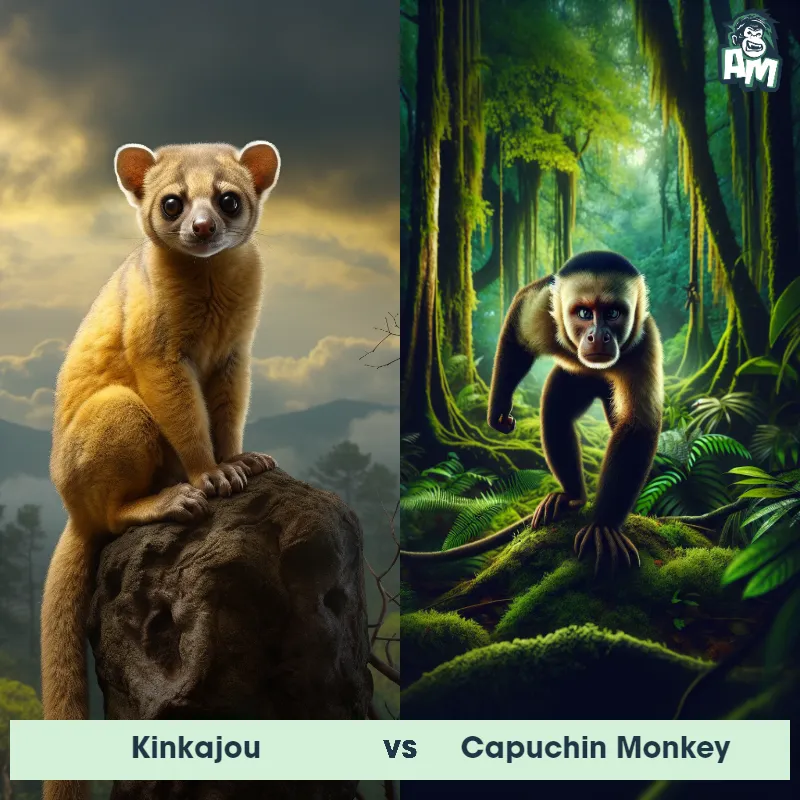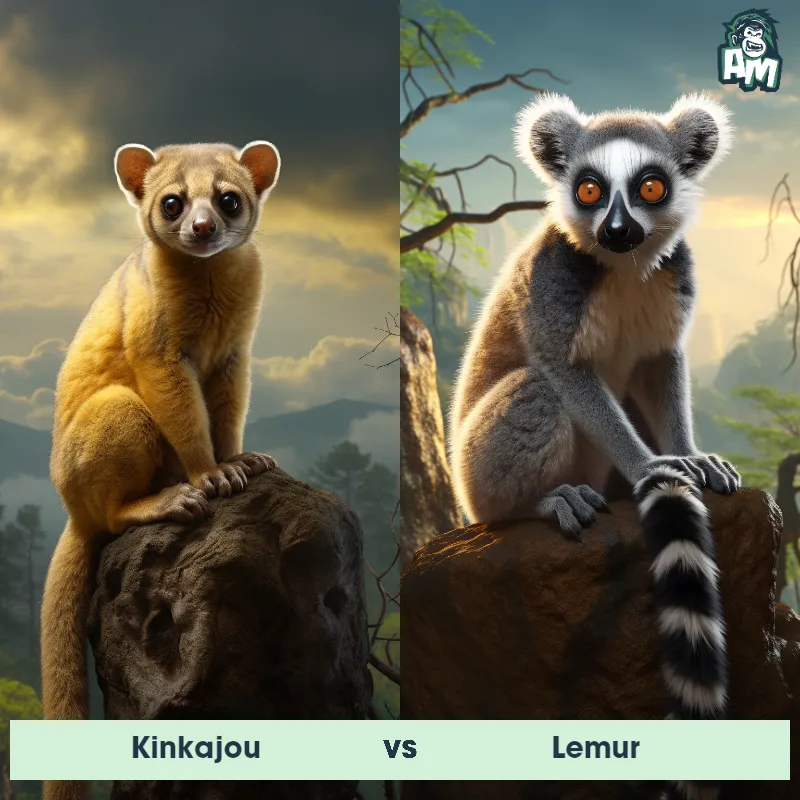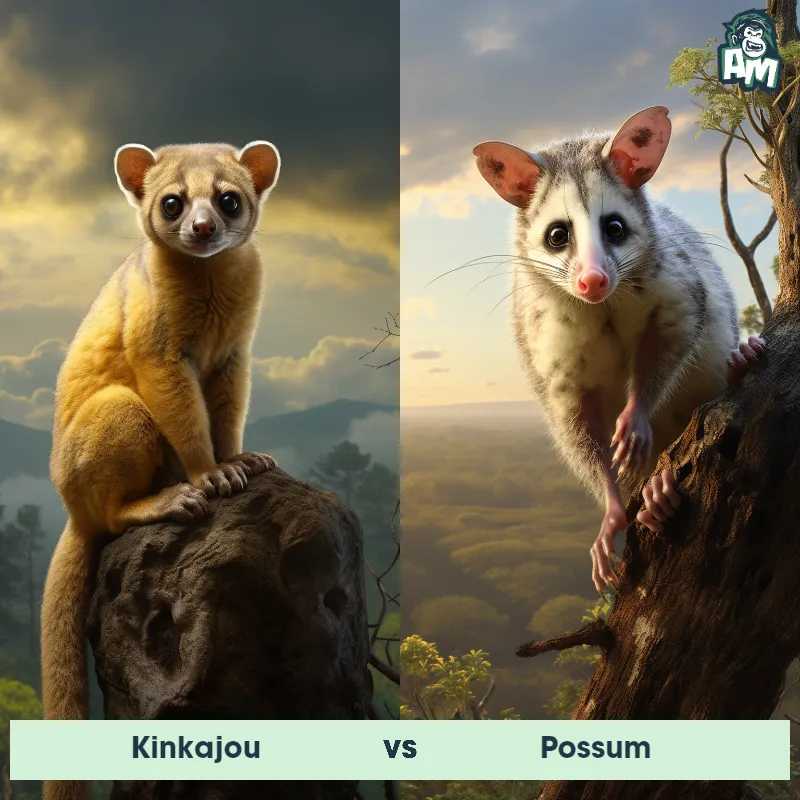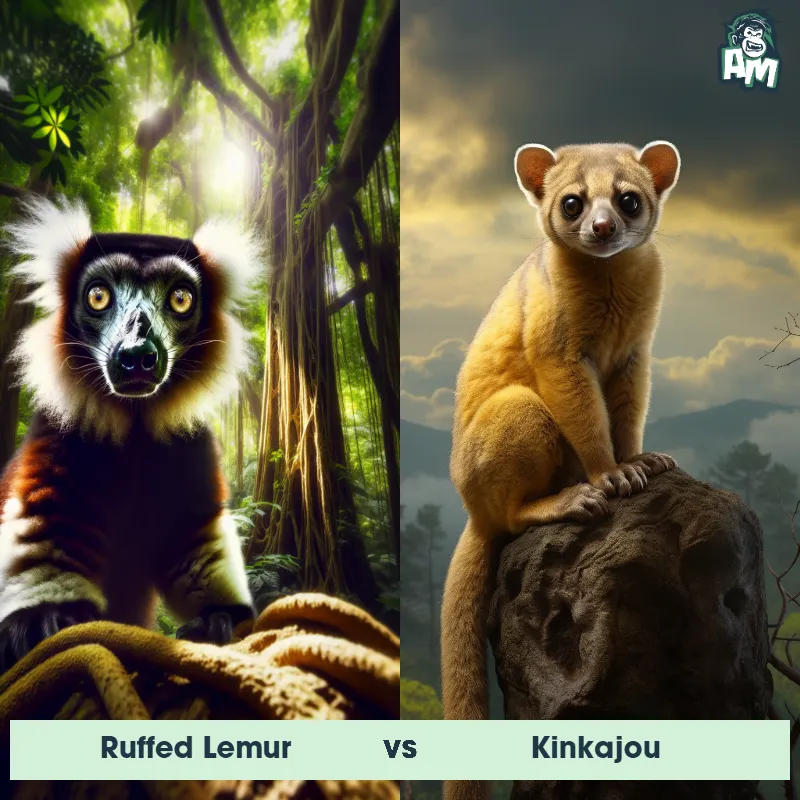The Kinkajou
The kinkajou, also known as the honey bear, is a small mammal native to the rainforests of Central and South America. It has a slender body, long tail, and round face with large eyes and rounded ears. Their fur is soft and short, ranging in color from golden brown to gray. Kinkajous have prehensile tails that they use for balance and climbing trees. They are nocturnal animals and spend their nights foraging for fruit, nectar, and small animals. They have a unique anatomy that allows them to rotate their ankles to climb down trees headfirst.
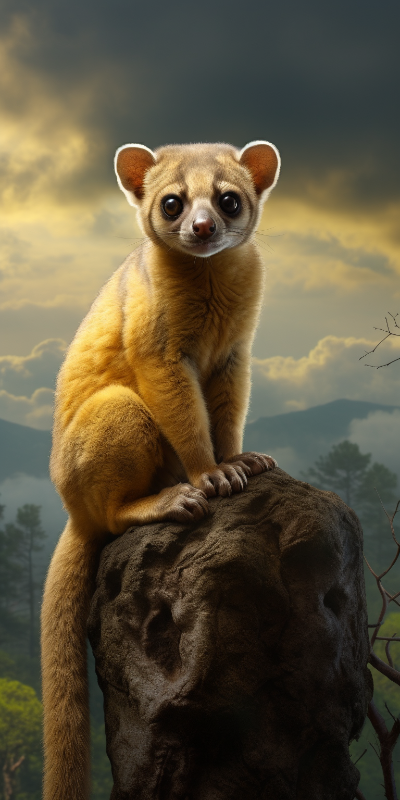
| Kinkajou | |
|---|---|
| Size | 16 to 30 inches (40.6 to 76.2 cm) |
| Weight | 3 to 10 pounds (1.36 to 4.53 kg) |
| Speed | 10mph (16km/h) |
| Key Strength | Agility and ability to climb trees quickly |
| Biggest Weakness | Small size and lack of powerful defensive mechanisms |
| Scientific Name | Potos flavus |
| Family | Procyonidae |
| Habitat | Rainforest |
| Geography | Central and South America |
| Diet | Fruits, honey, insects, and small vertebrates |
| Lifespan | 15 years - 23 years |

The Kinkajou
The kinkajou, also known as the honey bear, is a small mammal native to the rainforests of Central and South America. It has a slender body, long tail, and round face with large eyes and rounded ears. Their fur is soft and short, ranging in color from golden brown to gray. Kinkajous have prehensile tails that they use for balance and climbing trees. They are nocturnal animals and spend their nights foraging for fruit, nectar, and small animals. They have a unique anatomy that allows them to rotate their ankles to climb down trees headfirst.
Fun Fact: The kinkajou is an important pollinator of certain fruits and flowers in the rainforests where it lives.
| Kinkajou | |
|---|---|
| Size | 16 to 30 inches (40.6 to 76.2 cm) |
| Weight | 3 to 10 pounds (1.36 to 4.53 kg) |
| Speed | 10mph (16km/h) |
| Key Strength | Agility and ability to climb trees quickly |
| Biggest Weakness | Small size and lack of powerful defensive mechanisms |
| Scientific Name | Potos flavus |
| Family | Procyonidae |
| Habitat | Rainforest |
| Geography | Central and South America |
| Diet | Fruits, honey, insects, and small vertebrates |
| Lifespan | 15 years - 23 years |
Kinkajou Matchups
We use AI to simulate matchups between the Kinkajou and other animals. Our simulation considers size, strength, and natural predatory behaviors to determine the most likely outcome.

Can't find the Matchup you want?
Create Your Own MatchupKinkajou: Diet, Predators, Aggression, and Defensive Behaviors
What do Kinkajous eat?
Kinkajous are primarily frugivores, meaning they mainly consume fruits such as figs, mangos, and guavas. They also have a varied diet that includes flowers, nectar, insects, and even small vertebrates. In captivity, they are commonly fed a diet consisting of fruits, vegetables, and commercial primate chow.
Do Kinkajous have any predators?
Kinkajous do have predators in the wild, including large birds of prey such as owls and hawks, as well as predatory mammals like jaguars and ocelots. Their stealthy and nocturnal nature helps them avoid some predators, but they can still fall victim to larger animals.
Are Kinkajous aggressive?
Kinkajous are typically not aggressive animals if they are properly cared for and socialized. However, they may become aggressive if they feel threatened or cornered. They are generally docile creatures that prefer to avoid confrontation.
Do Kinkajous fight?
Kinkajous are not known for engaging in fights with one another. They are solitary animals in the wild and use vocalizations, scent marking, and body language to communicate and establish territories instead of physical combat. However, they may defend themselves if necessary.
How do Kinkajous defend themselves?
When threatened, Kinkajous will use various defense mechanisms to protect themselves. They may emit a high-pitched scream to startle predators, release a foul-smelling musk from their anal glands, or use their sharp teeth and claws to defend against attacks. Their agile climbing abilities also help them escape danger by climbing high into trees.
What is the Kinkajou's biggest weakness in a fight?
Despite their sharp teeth and claws, Kinkajous are relatively small and lightweight animals, making them vulnerable in physical confrontations with larger predators. Their primary defense strategy is to avoid conflict through stealth and agility rather than relying on brute strength.
Fun Fact: Kinkajous have a sweet tooth and are known for their love of honey. They will use their long tongues to lap up the sweet liquid from beehives or flower blossoms.
Fun Fact: Kinkajous have a unique defense mechanism. When threatened, they can emit a strong musky odor from scent glands located near their mouths, which can deter potential predators.



